Classic CDs: - 1985 - 2005
11-Jun-2008In a follow up to his series on classic LPs, Tim Mutum picks his selection of some of the classic CD releases since 1985.
Introduction:
It was a real challenge to identify six LP albums for the Classic LP articles that were recently published on 4barsrest. Choosing six CDs was an even more formidable task as the 20 year period from 1985 to 2005 saw a veritable feast of quality and quantity.
So, an almost impossible task once again (thanks Iwan for the challenge) and, as before, in each of the decades I have added some other close contenders.
The 1980s
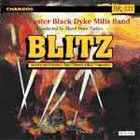 Blitz
Blitz
Black Dyke Mills Band
Conducted by Major Peter Parkes
Chandos CHAN 8370
Released - 1985
Producer: Brian Couzens, Engineer: Ralph Couzens
I have 109 Black Dyke CDs – every one ever issued. Some are reissues of LPs as was the case with the very first CD featuring a brass band. It was this highly acclaimed (both within and outside of banding) recording of four compositions that have entered folklore.
It was made at a time when Dyke was virtually invincible in the contesting arena. The recording is a celebration of what Major Peter Parkes describes as “that happy day” referring to 3rd October 1981 when Dyke won the National Championship for the fifteenth time, playing the title track, Blitz by Derek Bourgeois.
Although Bourgeois had already written some mammoth band pieces this was his first great success and arguably still is his finest. Blitz could round off the first half of a typical brass band concert if the conductor explained it. As Parkes rightly points out, “...it would be worth hearing just for the last 30 bars. The lip glissandi and the chromatic fall at the very end are marvellous.”
Blitz ends with disaster and collapse but Eric Ball’s journey (Journey Into Freedom) is towards an idealistic inner freedom in which he firmly believed. Compiling a list of favourite Eric Ball pieces would be moderately easy; and this rhapsody, in one complete movement divided into six short sections played without a break, would surely feature.
Like Eric Ball, Denis Wright has a firm place in the affections of banding people but probably more for his other achievements than for his compositions. Certainly, Tam O’Shanter’s Ride is one of his more successful works. It has a story line which is based on the poem of Robert Burns:
“A cautionary tale of the dangers of taking too much strong drink and interfering with the Devil’s business.
Whene’er to drink you are inclined,
Or cutty-sarks run in your mind,
Think! You may buy the joys o’er dear –
Remember Tam o’Shanter’s mare”.
Amongst the many mainstream musical luminaries invited to write for banding was Herbert Howells, and his Pageantry completes the programme. Progressive at the time of its writing in 1934 Pageantry still represents a major challenge to bands. The titles of the three sections tell the story of this popular and enduring work:
1. King’s Herald
2. Cortege
3. Jousts
Chandos Records and brass bands parted company many years ago partly, in my view, because bands only saw recordings as a revenue stream and not the other opportunities such as musical ones. It is a great shame as Chandos were very skilled in recording bands – the quality speaks for itself – but the product overall oozed class and CDs could often be found in ‘high street’ record shops giving valuable exposure to bands.
Thankfully, Blitz and many other Chandos CDs are still readily available and at good prices. I would certainly recommend this one – the impact of the opening of Blitz will hit you immediately and by the end of Pageantry I think you will recognise this as a pioneering recording in every respect.
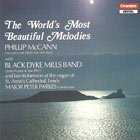 The World’s Most Beautiful Melodies
The World’s Most Beautiful Melodies
Phillip McCann
Black Dyke Mills Band / Iain Robertson at the organ of St Anne’s Cathedral, Leeds,
Conducted by Major Peter Parkes
Chandos CHAN 8441
Released - September 1985
Producer: Brian Couzens
Engineer: Ralph Couzens assisted by Bill Todd
Footballing analogies abound and you would have to say that Black Dyke is Manchester United, Major Peter Parkes is Sir Alex Ferguson and that Phillip McCann is Roy Keane. You might ponder on the latter but Keane was/is a perfectionist and highly competitive.
Having been involved with concerts where Phillip was a soloist and a conductor I have witnessed first hand the perfectionist streak within him and the desire to be the best. And quite simply you do not become a player of his quality or occupy the top seat at Dyke without those attributes.
McCann became principal cornet with the Band of Yorkshire Imperial Metals in 1963, then moved on to Fairey’s in 1967 and he joined Black Dyke Mills in June 1973.
Whoever had the idea to promote McCann’s distinctive, unique sound through a series of melodic solos under the title The World’s Most Beautiful Melodies deserves a medal. It was an inspirational idea and part of its success lay in the ability of the Chandos marketing team to secure wide exposure for the recording (Note: another benefit to bands that is not available in the cottage industry that has existed for many a year).
This extended to securing an extensive interview for McCann on the BBC Radio 2 John Dunn Show – a considerable achievement.
The recording is reputed to have sold well over 4,000 copies, minuscule in the mainstream recording world but nothing short of phenomenal in brass band terms.
It is of course a simple concept – lots of well known classical melodies with one of McCann’s trademarks solos included – Rusalka’s Song to the Moon, and one of many tracks arranged by Gordon Langford. My own favourite is Brahms Lullaby.
In summary let me quote the words of the immortal Harry Mortimer who had this to say about it, “Quite apart from the simple joy of listening to such beautiful sounds, in my opinion this album is also an impressive object lesson to all aspiring instrumental soloists – not necessarily cornetists, but any player concerned with breath control, phrasing, style, quality of tone and expression”.
Other contenders
Variations – Desford Colliery Caterpillar Band – Polyphonic QPRL 041D (1989)
Childs Play – featuring the Childs Brothers – Doyen DOY CD 001 (1989)
The 1990s
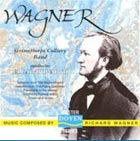 Wagner
Wagner
Grimethorpe Colliery Band
Conducted by Elgar Howarth
Doyen DOY CD 033
Released - December 1995
Producers: Nicholas and Alison Childs
Engineer: Harold Barnes
As Bram Gay succinctly points out in the programme notes, very little of Wagner has been plundered by the brass band arranger. A case of neglect given the wholesale use of orchestral transcriptions, especially opera, for nearly the first one hundred years of the brass band’s existence.
Gay argues the reasons are two fold. The limited listening span of the average brass band audience (anything over 12 minutes becomes a struggle) and the sheer complexity of Wagner’s scores such that many a would be arranger has been put off.
By the time of this recording, Howarth and Grimethorpe had been a musical partnership for 23 years and in recording terms had done the lot from Birtwistle to W Hogarth Lear.
Apart from this being an all Wagner recording, unique in itself, the interest lies in three of the arrangements. So, firstly to pass comment on the remaining two.
The first is Howard Snell’s now classic Procession to the Minster, which has entered folk lore as the ultimate blockbuster finale. Secondly, there is one time first horn player with Grimethorpe, Andy Armstrong (he plays on this CD) and his success in arranging Siegfried’s Funeral March.
Wright and Round are the publishers of an anonymous arrangement of a selection from ‘The Mastersingers’.
Bram Gay rates this “a neglected gem” but it is the two Alex Owen arrangements that create the most excitement. Howarth obtained the scores whilst on a visit to Australia – the score and parts of many Owen arrangements had been left by him during the Besses world tour of 1906.
The fascination is how Owen was able to make such arrangements – no recordings in those days and few, if any, opportunities to hear the music live. There are over 17 minutes of a Selection from “The Flying Dutchman” and more than 32 minutes of a selection from Tristan and Isolde.
As always when Howarth is conducting a band, especially one as great as Grimethorpe, the performances become something special and this is no exception. Truly one of the great recordings of music and playing to come out of the last decade.
Here are the players who performed on this recording:
Soprano – Nigel Fielding
Principal cornet – Shaun Randall
Solo cornets – Duncan Byers, David Arnold and David Barraclough
Repiano – Mick Kennedy
Second cornets – Steve Peacock and Steve Bastable
Third cornets – Colin Brook and Bob Clayton
Flugelhorn – Paul Hughes
Solo horn – Scott Bennett
First horn – Andy Armstrong
Second horn – Adrian Brooke
Solo baritone – Robert Archer
Second baritone – Cliff Hopes
Solo euphonium – Robin Taylor
Second euphonium – David Welsh
Solo trombone – Jonathan Beatty
Second trombone – Andy Hirst
Bass trombone – Andrew Snell
EEb bass – Paul Davies and Roy Bowater
BBb bass – Simon Gresswell and Malcolm Clegg
Percussion – Peter Matthews, Julian Warburton and Ian Matthews
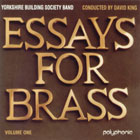 Essays for Brass – Volume One
Essays for Brass – Volume One
Yorkshire Building Society Band
Conducted by David King
Polyphonic QPRL 080D
Released - August 1996
Producer: Philip Sparke
Engineer: Michael Moor
This gains the tag of a classic CD as Yorkshire Building Society Band were the first non-Salvation Army band to record a programme consisting exclusively of Salvation Army repertoire.
They went on to record a further two volumes. I also believe this CD marked the real arrival of the band and its dynamic conductor, David King, as a major force in the recording world, as this was the first of a series of significant recordings. Overall this partnership released 18 CDs between December 1995 and April 2006 of which nine could easily be labelled classics.
It is interesting how the world has moved on in a mere 12 years. For instance the CD ends with Ray Steadman-Allen’s Victorian Snapshots – On Ratcliff Highway. In 1996 we were celebrating this milestone recording and the general availability of SA music. Yet last year this piece, which draws its inspiration from a sketch on the front page of the SA periodical The War Cry of 15th May 1886, was used as the 2007 First Section test piece of the National Finals in Harrogate.
The CD opens with Leslie Condon’s The Call of the Righteous. Written for the then Tottenham Citadel Band’s 1964 tour of North America this bright, colourful work is receiving a well deserved revival through its inclusion on the new ISB CD Daystar.
Dean Goffin is of course well known to the band world through his Rhapsody in Brass. In fact this work of 1949 (for the September Belle Vue contest) brought him to prominence rather than his SA work.
However, the situation was quickly rectified with the publication in 1950 of a work that had gathered dust in the SA’s Music editorial department. It was the Meditation – The Light of the World, which is possibly one of the most intense and moving works ever written for brass band.
It is preceded on the disc by what was intended to be a companion to Rhapsody in Brass but was revised for SA use. Rhapsodic Variations – My Strength, My Tower. Peter Graham regards this as “...a masterpiece…a cornerstone of the SA repertoire”.
There is a second Ray Steadman–Allen piece on the disc, The Lord is King, which is another very demanding work technically.
However, it is the two pieces that follow that I often turn to when this disc captures my eye. Now we have the luxury of all of Heaton’s music on CD in a set, but in 1996 the choice of Just As I Am opened up a new world to me as did, perhaps surprisingly, Eric Ball’s work for the 1962 Bandmasters Councils Festival at the Royal Albert Hall.
The Kingdom Triumphant uses three hymn tunes, the finale being Lo, He comes with clouds descending, which is guaranteed to gladden the heart in a way that few pieces can. These two pieces had me searching out recordings of Salvation Army bands in earnest.
Many a CD now contains a Salvation Army publication but it was this recording that really broke the ice and set the standard for all that followed.
Other contenders
The Music of Robert Simpson – Desford Colliery Caterpillar Band – Hyperion CDA 66449 (1991)
A Night at the Opera – Grimethorpe Colliery Band - Doyen DOY CD013 (1991)
A Muse of Fire (Music by Walton) – Black Dyke Mills Band – ASV CD WHL 2093 (1995)
The Planets – Black Dyke Mills Band – Doyen – DOY CD050 (1996)
The 2000s
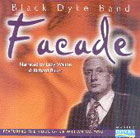 Façade – Music by William Walton
Façade – Music by William Walton
Black Dyke Band
Conducted by James Watson
Narrators: Lady Walton and Richard Baker
Doyen DOY CD 085
Rreleased - September 2000
Producers: Nicholas and Alison Childs
Engineer: Harold Barnes
This was Black Dyke’s second Walton disc and highly underrated, receiving very little media coverage in the banding world. Hardly surprising in one sense since a good old fashioned march is much preferred to anything that might just creep outside the comfort zone.
The centre piece of this CD is the title track. Shortly before the recording was released I was fortunate enough to be involved in the presentation of a performance of Façade with Lady Walton and Richard Baker (who provide the narration) with the City of London Sinfonia in the delightful setting of Lavenham church in Suffolk.
Afterwards I wondered how a brass band and the same narrators would compare with the lighter touch of the orchestral ensemble. Well, I soon found out and in my view Ted Watson’s arrangement of the music works splendidly.
Edith Sitwell wrote her façade poems in the 1920s as studies in word rhythms and onomatopoeia. On first hearing they can seem nonsensical. They evoke the bourgeois culture of turn-of-the-century England and the poet (and her brothers) decided they would be suitable for presentation as a drawing room entertainment but should be accompanied by music. Enter Walton.
There is a long story from here on but suffice it to say here that the definitive published version of 21 items appeared in 1951. Ted Watson chose wisely and 13 of the 21 poems are included on this CD with Something Lies Beyond the Scene and Popular Song being switched in order. None of the poems is long – most a minute or so – and they are immensely entertaining and that is what is intended.
What Walton would have made of the arrangement featured here we shall never know, but he had a definite interest in brass bands describing them as “...wonderful players, especially the Grimethorpe (sic) and Bess (sic) o’ the Barn bands”. Certainly, two of his marches have transcribed well, the second of which, Orb and Sceptre, makes a stately opening to the CD and a prelude to the entertainment.
The Battle of Britain Suite also has an interesting story but the extracts used on this CD – Dog Fight and March Introduction, March, Siegfried Music – are all that made it into the film, the rest being provided by Ron Goodwin. The drama and intensity of it all comes across vividly.
Lastly, there is more film music, this time Richard lll which dates from 1955. A seven movement suite was compiled from Walton’s original score.
The early movements are pomp and circumstance in style and ideal for brass band. After Robert Portal delivers the monologue, The Winter of our Discontent, a seductive Elegy leads into The Princes in the Tower where, in the film, the music is the backdrop to the suffocation of the two young princes. The suite is completed by the Battle of Bosworth Field and the death of Richard and Finale which concludes in march format.
The fact that the CD was recorded in two separate sessions is rather evident with a mix of bright spaciousness and warmth/closeness in the sound.
Black Dyke continue to do wonderful things but it was the James Watson tenure that enabled recordings of this type to surface supported, of course, by the entrepreneurial spirit of Doyen’s owner, Nick Childs.
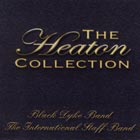 The Heaton Collection
The Heaton Collection
Black Dyke Band and the International Staff Band, conducted by Nicholas Childs and Stephen Cobb
SP&S:- SPS 158CD
Released September 2002
Producers: Paul Hindmarsh (Black Dyke) and Brian Hillson (ISB),
Engineer: Russell Dawson-Butterworth
This is an inspired double CD set of absolute pure joy. All of Wilfred Heaton’s published music at that time was recorded and thoughtfully explained in two lavish booklets and performed by two distinguished bands – all in all something rather special.
Arguably, the two most challenging works are played by Dyke on CD1. Partita is a 25 minute, four movement work of symphonic proportions written in1947.
Extremely advanced at the time of writing, over 60 years on it could not be regarded in the same way – indeed the listener merely needs to enjoy the craftsmanship on display – but there is no denying the huge stamina needed in performance. Those two factors alone would have condemned it just after the war, but then a similar fate befell other Heaton efforts.
On the other hand Contest Music is more easily accessible, but it has had time to become familiar, but not so in 1973 when it was completed for the National Finals but not used as it was, amongst other reasons, regarded as too ground-breaking.
Another reject at its inception, this time by the Salvation Army, was Celestial Prospect. Written in the 1940s and reworked by Heaton in the 1960s, this is a set of variations on the Salvationist song Come, Comrades Dear. Here the ISB perform what turned out to be the intriguing choice for the 2nd Section bands at the 2003 area contests.
The balance is a collection of shorter but no less significant works that show Heaton as innovative, playful, humorous and seriously at the ‘cutting edge’.
Each has its own story and they are all fascinating in their own way. When I first heard it I found myself constantly humming Victory for Me, smiling at the humour of the march Glory! Glory!, warming to gems like The Golden Pen and The Children’s Friend and losing no interest in hearing yet again Heaton’s most familiar two trademarks – Praise and Toccata, Oh The Blessed Lord.
At the time of this release I reflected on how much we know of Heaton and most probably, how much, much more we don’t and possibly never will. And as is often the case, real appreciation only arrives after the composer is not able to share the enjoyment with us.
There are but a handful of really great brass band recordings. This in my opinion is one of them.
Other contenders
Eric Ball- The Undaunted – Grimethorpe Colliery RJB Band – Doyen DOY CD 108 (2001)
The Trumpet of the Angels – Black Dyke Band – Doyen – DOY CD 185 (2004)
Music of the Spheres – Yorkshire Building Society Band – Egon – SFZ 124 (2004)
Gaia Symphony – Buy As You View Band – Doyen – DOY CD 188 (2005)















